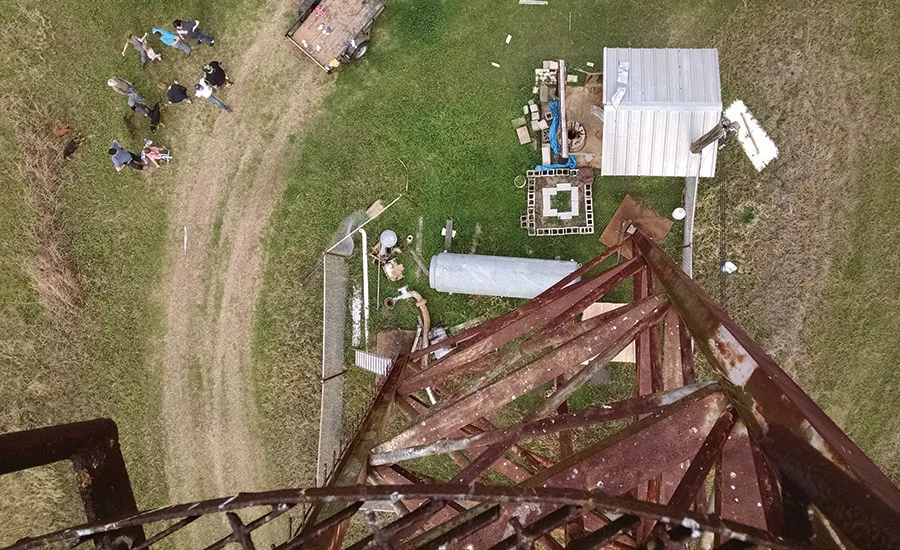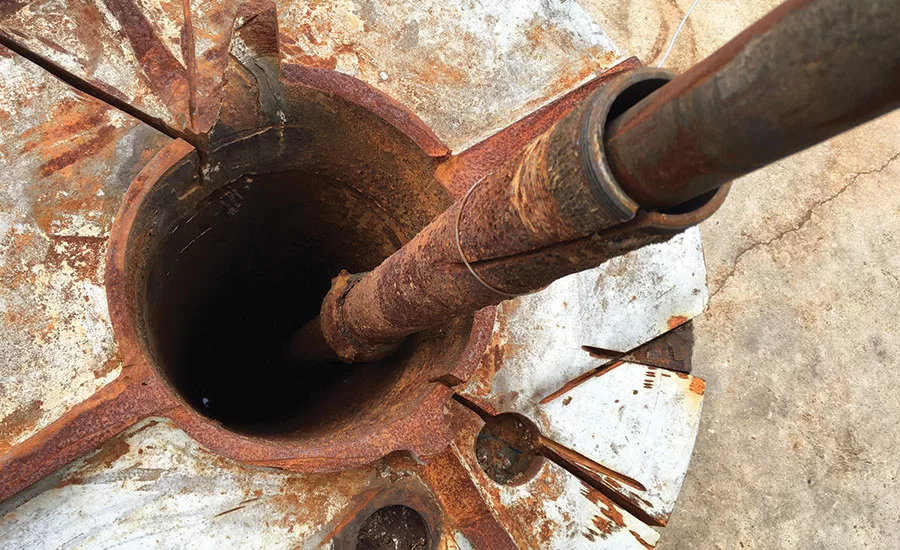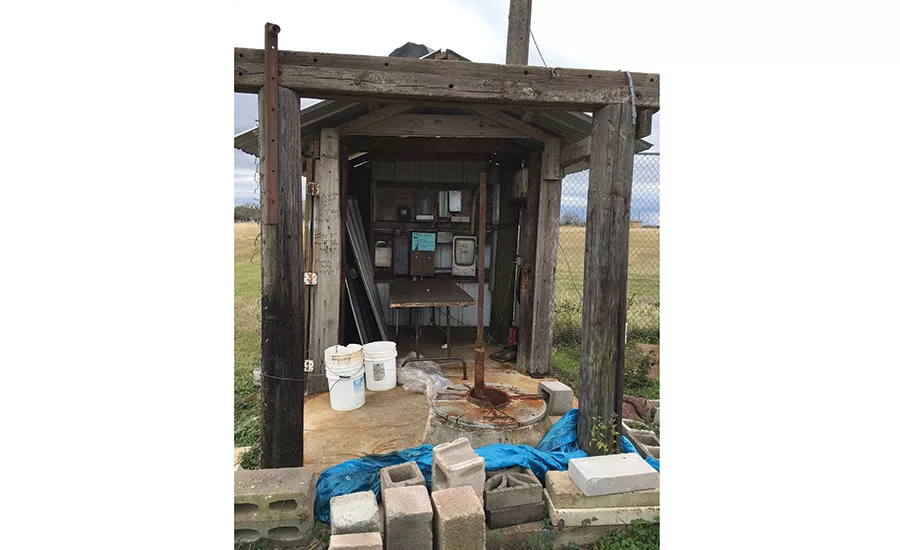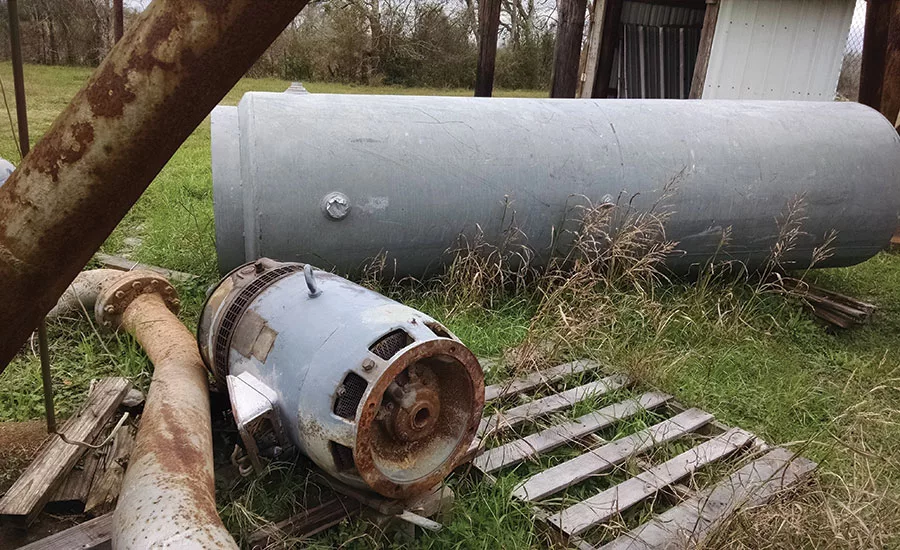Shelter for Sex Trafficking Victims in Need of New Water Well

The water well at Kendleton Farms that brings water to the entirety of the campus is out of service due to sanding. Tim Mulville is hoping to help get it replaced. Source: Elijah Rising photos

Mulville’s goal is to bring the drilling community together to volunteer expertise, donate equipment, or both in order help get water to the buildings that will house survivors and victims’ advocates as soon as possible.

The Elijah Rising group’s acquisition of the campus has been a stretch for staff, so the group says getting a working well to supply the whole campus would be a huge relief. Source: Elijah Rising

At this point, Mulville says a pressure tank has been donated for a new well and a submersible pump and drilling fluids will likely be donated. Everything else necessary to drill and complete a water well is still needed. Source: Elijah Rising
Over the past 17 years, Tim Mulville, president and CEO of Missouri City, Texas-based non-profit Wells of Hope, has helped bring potable water wells to communities across Mexico and Africa. While each mission was, of course, unique, Kendleton Farms — the site of his latest venture — is especially out of the ordinary, and not because it is just 30 minutes away.
Kendleton Farms is the new home of the Houston-based non-profit Elijah Rising. The organization recently purchased the campus in order to open the largest aftercare facility in the country for adult victims of sex trafficking.
When fully developed, the 85-acre property will serve as a therapeutic community, housing more than 100 women who have survived the commercial sex industry. There, they will live and work in order to re-enter society with job skills, savings and a viable income.
One essential feature of Kendleton Farms is the plan to scale a for-profit business wholly run by survivors. Opportunities for sustainable farming and microenterprise also will be created in an effort to tackle one of the most significant reasons women return to lives of sexual exploitation — a lack of marketable job skills.
Elijah Rising has served victims of the commercial sex industry in Houston since 2012, coordinating outreaches and ministry into places where they are being exploited. The area has lacked a largescale facility where adult women can go to live and heal.
Unfortunately, the existing water well intended to distribute potable water to survivors, employees and volunteers at Kendleton Farms is defunct, and addressing the problem will not be cheap.
“They don’t have the funding, period. They raise funds, but they just got started and they just don’t have the funds to do this at all at this point in time,” Mulville says. “If we have the volunteers to be able to do this, it’ll expedite what they’re trying to accomplish down the road.”
Elijah Rising is one of many missionary organizations that has strong ties to Mulville’s church. Cat French, Elijah Rising’s founder, worked as a sociology professor for many years and, upon realizing the same things she was teaching were happening right down the street from her, she started the organization.
Although Mulville is not directly affiliated with the group, he is well acquainted and felt compelled to check the property out after learning it had been acquired in the summer of 2015. He knew it had been sitting empty for quite a few years and might need some TLC. That’s when he learned there was no running water. He says he is hoping the wider drilling community might be able to help.
“We need to do something,” he says. “They have a lot of TLC that needs to be done before they get the campus up and running, but the main thing is water. Water is the first building block anywhere. … We so desperately need it.”
A Well to Replace
Kendleton Farms has two wells. Mulville says the larger of the two is 300 feet deep with 10-inch inside casing. He says he is not sure about the outside casing, but that it is probably around 16 to 18 inches. The smaller well has a 4-inch diameter and he says it is anywhere from 260 to 290 feet deep.
Mulville was able to redevelop the small well, but not the larger. After trying, and failing, to fire it up the first time, he called for help. The first licensed water well drilling contractor removed the motor, set their equipment up and made an attempt to pull everything out. They pulled back 85,000 pounds on the well and were not able to even budge it. The second contractor, equipped with special equipment for problem water wells and oil wells, said not to bother reinstating it because sand had taken over. Both concluded that the 10-inch steel casing rusted through and the main casing filled the inner casing with sand.
The first company offered to drill a new large-diameter well for Kendleton Farms for $35,000. The second contractor’s estimate: $130,000.
Determined to get the well working without having to face such costs, Mulville gave it one last try. He says he separated the main impeller and shaft from the casing and it would not fall down the hole. He could see that it was definitely sanded up. So he cleaned it out with drilling foam, got some of the sand out and put a compressor on it. Then he got a three-phase, six-horsepower submersible pump that had been donated and slid it down the borehole.
“It worked about a week and then quit,” Mulville says. “It sanded up. I was able to get water down the main 4-inch line that’s on that big pump, but couldn’t sustain it because of the sand problem.”
Hopes for Help
He has come to terms with the first and second opinions of local water well contractors. A brand new well will need to be installed, but it will demand volunteer efforts.
Mulville says that a 900-gallon pressure tank has been donated, another submersible pump may be donated, and he is confident that he can find a source for donated drilling fluids. Everything else that goes into drilling and completing a water well is still needed, and any combination of tools and labor from drillers near or far would be warmly welcomed.
“If one person has the heart to say, ‘I’ll help and I’ll do it turnkey,’ or if it takes a combination of five to 50 in unison to say, ‘We have the heart but we can only put this amount of parts in,’ or whether it’s time or money, then combine that all to make that all work,” Mulville says. “They are a 501(c)3 non-profit, so Kendleton would provide them a letter of donation to do that.”
Making Due
In the meantime, Mulville has managed to get the smaller well back to work. He cleaned it out, added a compressor and installed the submersible pump he had tried to make work in the larger well. The water from the smaller well is being pumped into a nearby residential duplex housing employees.
The current setup is not at all sustainable though, because water from the functioning well does not reach the many other Kendleton Farms buildings located farther away.
Mulville says staff residents of the homes without water are hauling a trailer with a 350- to 400-gallon Fiberglas tank on it to the small well. After pumping the tank full, they haul it back to their house and pump it through an outside hose faucet that runs backwards to push water inside the house instead of outside.
The campus houses nine buildings. Two larger buildings — both more than 20,000 square feet — are going to be used to house the women survivors of sex trafficking, says Micah Bailey, director of operations for Elijah Rising. The buildings have multiple dormitory rooms and a couple of small apartments built into them, so each of the buildings can house 20 to 25 women easily. Kendleton Farms also has independent, free-standing resident homes on the property, making maximum capacity anywhere from 75 to 100, with 50 being a comfortable number, she says.
There is also a hobby shop that used to be used as an auto shop and a wood shop. A large barn will be used to house horses and other farm animals and equipment. In addition, the property includes five residential houses. One will be used as a crisis care center; the rest will be used as staff homes and also for interns. At this point, all of those buildings, with the exception of the duplex hooked directly to the small water well, still need water.
The larger two buildings that will house survivors are too big to hook up a water tank in the meantime. If they did try that method with the larger spaces, water would likely be depleted in a few hours. The dilemma, Bailey says, is the organization cannot occupy those buildings with residents until the water situation is fixed. “The dilemma is that it’s hard to do renovations and obviously we can’t put women resident survivors in those buildings until we can figure it out. I don’t know how else to describe it. It’s crucial that we have to get that well working again or build another one.”
The new, larger well would serve the entire property and Mulville is considering connecting the smaller well into the system for times when a backup water source is necessary.
Really, he says it would have been great to have the water problem addressed “yesterday,” because the initiative it will support is so important. “We’ve been working on it as much as we could and just need to see guys that have a heart that want to help.”
What a Relief It Would Be
Getting a working well in place and water to the entirety of Kendleton Farms would be a huge relief, Bailey says. The Elijah Rising team is working for a social justice cause, and they are not necessarily technically and mechanically inclined to the extent necessary to renovate the many outdated pieces of the property. For that reason, the entire process of acquiring the campus and working on it has been a stretch for the staff, and efforts like those being made by Mulville are extremely appreciated.
“We’re really on this big learning curve; not just with the well, but with the whole process,” she says. “We’re definitely not expecting a handout or demanding that in any kind of way, but any help we can get, whether that be an in-kind donation or financial or just experiential knowledge is just a huge relief to our whole staff and to the whole mission.”
A large part of what Elijah Rising does is oversee a hotline for victims of trafficking. Bailey says they have helped place women in shelters, but those shelters are mostly not equipped to handle their needs. Realizing that the area lacks a much needed large-scale facility where adult women can go to live and heal, the mission hopes Kendleton Farms will fill that void.
Ideally, Bailey would like to see the well operational within the next couple of months because they are expecting to get a first-phase property permit to house women within that time period. She welcomes any experiential expertise and help that will keep the progress going.
For now, Mulville is continuing to spread awareness about the need for help, and a large part of what keeps him going is knowing how great it will feel to see everything come to fruition. “I’ll be overwhelmed,” he says. “I’m an old man, but I can really dance. I’d be definitely dancing out there.”
To make a donation to the Kendleton Farms water well initiative, contact Tim Mulville at 713-416-9574 or katetheco@gmail.com, or email Elijah Rising at kendleton@elijahrising.org.
Looking for a reprint of this article?
From high-res PDFs to custom plaques, order your copy today!


